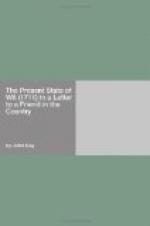Before I proceed further in the account of our Weekly Papers, it will be necessary to inform you, that at the begining of the Winter, to the infinite surprize of all Men, Mr. Steele flung up His TATLER, and instead of Isaac Bickerstaff Esq.; Subscrib’d himself Richard Steele to the last of those Papers, after an handsome Compliment to the Town for their kind acceptance of his Endeavours to divert them. The Chief Reason he thought fit to give for his leaving off writing, was, that having been so long look’d on in all publick Places and Companies as the Author of those Papers, he found that his most intimate Friends and Acquaintance were in Pain to Act or Speak before him. The Town was very far from being satisfied with this Reason; and most People judg’d the true cause to be, either that he was quite spent, and wanted matter to continue his undertaking any longer, or that he lay’d it down as a sort of Submission to, and Composition with the Government for some past Offences; Or lastly, that he had a Mind to vary his Shape, and appear again in some new Light.
However that were, his disappearing seem’d to be bewailed as some general Calamity, every one wanted so agreeable an Amusement, and the Coffee-houses began to be sensible that the Esquires Lucubrations alone, had brought them more Customers than all their other News papers put together.
It must indeed be confess’d, that never Man threw up his Pen under Stronger Temptations to have imployed it longer: His Reputation was at a greater height than, I believe, ever any living Author’s was before him. ’Tis reasonable to suppose that his Gains were proportionably considerable; Every one Read him with Pleasure and Good Will, and the Tories, in respect to his other Good Qualities, had almost forgiven his unaccountable Imprudence in declaring against them.
Lastly, It was highly improbable that if he threw off a Character, the Ideas of which were so strongly impress’d in every one’s mind, however finely he might write in any new form, that he should meet with the same reception.
To give you my own thoughts of this Gentleman’s Writings, I shall in the first place observe, that there is this noble difference between him and all the rest of our Polite and Gallant Authors: The latter have endeavour’d to please the Age by falling in with them, and incouraging them in their fashionable Vices, and false notions of things. It would have been a jest, sometime since, for a Man to have asserted, that any thing Witty could be said in praise of a Marry’d State, or that Devotion and Virtue were any way necessary to the Character of a fine Gentleman. Bickerstaff ventur’d to tell the Town, that they were a parcel of Fops, Fools, and vain Cocquets; but in such a manner, as even pleased them, and made them more than half enclin’d to believe that he spoke Truth.
Instead of complying with the false Sentiments or Vicious tasts of the Age, either in Morality, Criticism, or Good Breeding, he has boldly assur’d them, that they were altogether in the wrong, and commanded them with an Authority, which perfectly well became him, to surrender themselves to his Arguments, for Vertue and Good Sense.




